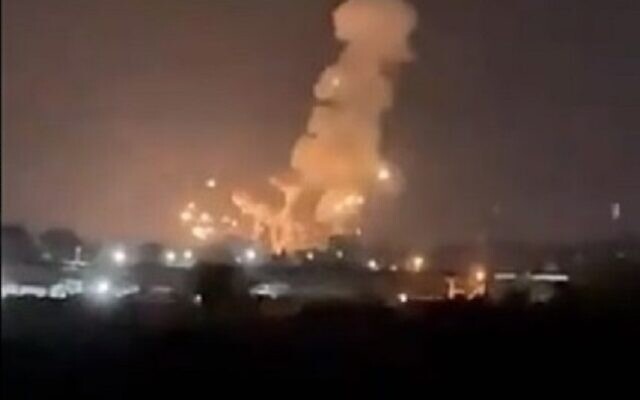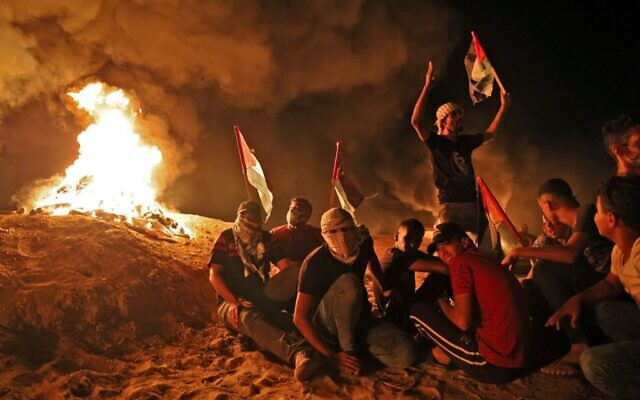Army says it hit sites in Khan Younis in southern Strip, after airborne explosive devices spark three fires near Israeli towns bordering Hamas-run enclave

The Israel Defense Forces carried out a series of retaliatory airstrikes in southern Gaza late Monday night after incendiary balloons from the Hamas-run enclave sparked three fires near Israeli towns bordering the Strip.
The military said it hit a Hamas rocket production facility and training camp in Khan Younis. Footage uploaded to social media showed the strikes lighting up the skies. There were no immediate reports of casualties.
Earlier Monday, incendiary balloons launched from the Strip sparked three fires in Israel’s Sha’ar Hanegev Regional Council. Firefighters managed to put out the fires before they could cause significant damage.
Gazans have continued to launch incendiary devices attached to kites or balloons into Israel despite warnings from Jerusalem of zero tolerance for such attacks.
Tensions with Gaza have remained high amid intensified efforts to shore up a ceasefire brokered after May’s war between Israel and Gaza-based terrorists, including a new arrangement for bringing Qatari cash into the Strip to ease poverty there.
The IDF’s Southern Command was preparing on Monday for the possibility that ceasefire talks managed by Cairo could break down, leading to an upsurge in violence and renewed rioting on the border.
Another angle of the IAF strike near Khan Younis in southern Gaza pic.twitter.com/hFGJtbFY2v
— Emanuel (Mannie) Fabian (@manniefabian) September 6, 2021
Over the weekend, Hamas spokesman Abdel Latif al-Qanou warned in a statement that, “Our Palestinian people in the Gaza Strip are determined to extract all their demands and break the siege on the Gaza Strip and no longer accept the gradual easing [of restrictions].”
He added that “our people’s options are open and all tools and means are available to pressure the occupation and oblige it to lift the siege on our people.”
Qatar and Egypt have been closely involved in efforts to improve conditions in Gaza in the wake of May’s 11-day war between Israel and Hamas, including the transfer of aid to the needy, greater allowances for goods and building materials to enter the Strip and more.
A plan was recently announced to allow Qatari aid back into Gaza, but many other issues remain unresolved.
The past week saw an increase in protests along the border as so-called “night confusion units” held nightly demonstrations, setting tires alight at the border and lobbing improvised explosives at Israeli troops.
The “night confusion units” do not officially tie themselves to Hamas, though their activities could not take place without the approval of the terror group that rules the Strip.
The riots came at the same time as Israel allowed dozens of truckloads of construction materials into the Strip.

The most severe recent border riots took place on August 21. The violent protest saw hundreds of Palestinian protesters approach the fence, throw stones, and burn tires. Israeli troops responded with tear gas, rubber bullets, and a form of live fire.
An Israeli Border Police officer, Barel Shmueli, 21, was shot at point-blank range when a Palestinian man approached a slit in a barrier where Shmueli was stationed and fired a pistol at him. He was critically injured and later died.
Two Palestinians who took part in the protest, including a 13-year-old boy and a member of the Hamas terror group with rules the Strip, were shot by troops and also later died.
Last month, Qatar and the United Nations announced that they had signed an agreement to return some Qatari subsidies to the Gaza Strip.
The funds do not include payments to Hamas civil servants, who also received cash from Qatar before the May conflict between Israel and terror groups in the Gaza Strip.
As reported by The Times of Israel
